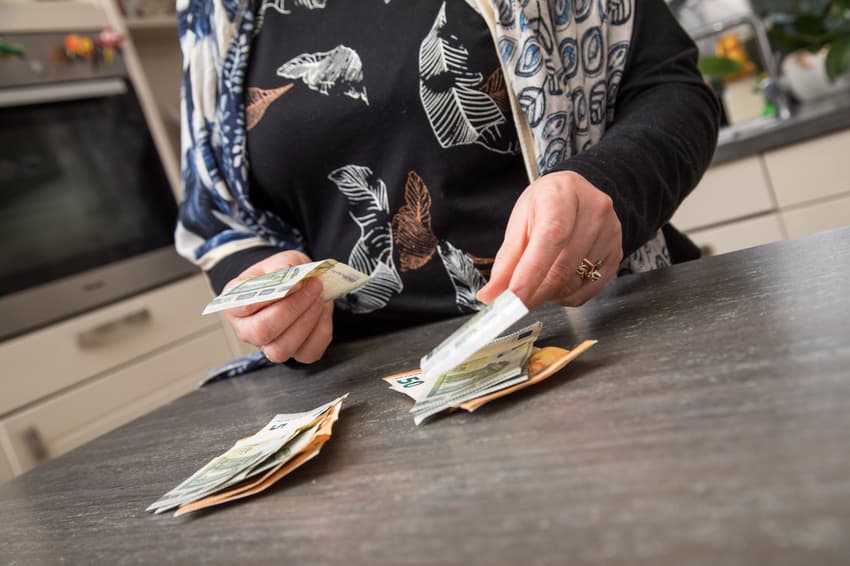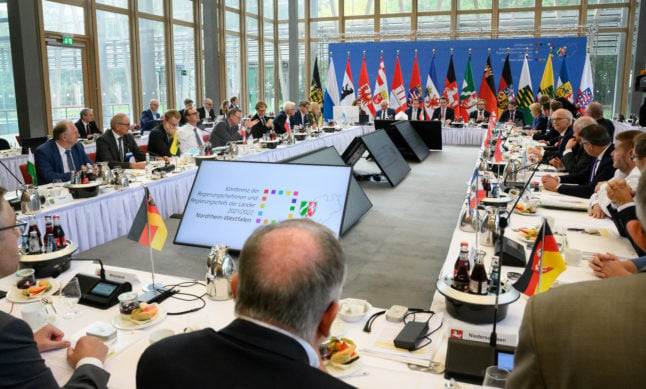German regional leaders call for energy price cap

German state leaders are calling for the government to introduce an energy price cap to help households with rising bills. But there's still uncertainty over who would foot the bill.
After Germany's 16 state leaders held consultations on Wednesday, they urged the coalition government - made up of the Social Democrats (SPD), Greens and Free Democrats (FDP) - to take action.
"Now the 'traffic light' coalition must finally get its act together and also declare its willingness to join us in addressing the necessary solutions," Thuringia's state premier Bodo Ramelow told Redaktionsnetzwerk Deutschland (RND).
The Left party politician said people in Germany were waiting for "decisive and united action" on how to deal with rocketing energy prices.
The heads of states called for an energy price cap on electricity and gas to limit the cost explosions for private households and companies.
Chancellor Olaf Scholz (SPD) was not at the meeting because he has Covid-19. He will join a special meeting with the states next week.
READ ALSO: German states call for more support to help people with rising energy bills
Who would pay for an energy price cap (Energiepreisdeckel)?
As The Local has been reporting, Germany is considering dropping a controversial gas levy that would have seen some of the soaring costs of gas passed onto consumers.
The levy was set to be shelved earlier this week, however, things have gone quiet on the government front - perhaps because Scholz is having to take time out due to Covid.
At the moment there's a strong a push instead towards introducing an energy price cap to limit the amount paid by consumers. But it's unclear how it would be paid for, especially since Finance Minister Christian Lindner (FDP) wants to stick to the so-called 'federal debt brake', which limits the amount the government can borrow.
Others are calling for this brake to be suspended to pay for a price cap.
READ ALSO: Will Germany set a gas price cap - and how would it work?
According to Berlin's mayor Franziska Giffey (SPD), the subject of the debt brake was the most contentious factor among the states. The question of whether new loans should be taken out to finance relief "we were not able to conclusively clarify," said the deputy chairwoman of the conference of state premiers after the meeting.
But Giffey added that she believes the central government has a duty to pay for most of it. "At this point, we have a very clear demand to the federal government that such an energy price cap can only be financed by the federal government nationwide," Giffey told broadcaster RTL.

German state leaders attend the conference on Wednesday. Photo: picture alliance/dpa | Bernd von Jutrczenka
The states are prepared to make their contribution to relieving the burden, "but the energy price cap must come from the federal government," she insisted. Giffey had previously signalled that costs in the triple-digit billions could be expected to fund a price cap.
North Rhine-Westphalia's economic minister Mona Neubaur (Greens) said that the central government would have to bear a "significantly higher than envisaged share of the burden".
Brandenburg's head of government Dietmar Woidke (SPD) spoke out in favour of dropping the debt brake in order to finance the energy price cap.
Meanwhile, Mecklenburg-Western Pomerania's leader Manuela Schwesig (SPD) said the states agreed that "excess and windfall profits" of energy companies should be skimmed off to finance an energy price cap.
READ ALSO: German households see record hikes in heating costs
What are other groups saying?
The Taxpayers' Association said there was room for the states to contribute more to the financing.
"I see that the states are currently accumulating high surpluses in the billions, while the federal government is getting stuck deeper and deeper in crisis mode and in its debts," the association's president, Reiner Holznagel, told RND.
He called for the energy and inflation crisis to be tackled equally by all levels of government. "It must not be the case that the federal government becomes the lone player and the states comment from the sidelines," he said.
Meanwhile, calls are growing elsewhere for an energy price cap.
Gerd Landsberg, of the German Association of Towns and Municipalities, said it could "really help people, the municipalities, but also the small and medium-sized businesses." He said it was important for a cap to cover all energy sources.
The president of the German Institute for Economic Research (DIW), Marcel Fratzscher, also believes it's a good option. "There are certainly better solutions in principle than an electricity and gas price brake, but in this emergency, such a brake is the best option," he said.
The social association VdK urged for "an affordable basic quota of gas and electricity for all households".
VdK president Verena Bentele said: "The cold season is here, and more and more people are afraid of receiving high gas and energy bills in their mailboxes because they no longer have enough money." To finance the relief measures, she proposed a "fair wealth tax" and taxation of profits from energy firms.
Comments (1)
See Also
After Germany's 16 state leaders held consultations on Wednesday, they urged the coalition government - made up of the Social Democrats (SPD), Greens and Free Democrats (FDP) - to take action.
"Now the 'traffic light' coalition must finally get its act together and also declare its willingness to join us in addressing the necessary solutions," Thuringia's state premier Bodo Ramelow told Redaktionsnetzwerk Deutschland (RND).
The Left party politician said people in Germany were waiting for "decisive and united action" on how to deal with rocketing energy prices.
The heads of states called for an energy price cap on electricity and gas to limit the cost explosions for private households and companies.
Chancellor Olaf Scholz (SPD) was not at the meeting because he has Covid-19. He will join a special meeting with the states next week.
READ ALSO: German states call for more support to help people with rising energy bills
Who would pay for an energy price cap (Energiepreisdeckel)?
As The Local has been reporting, Germany is considering dropping a controversial gas levy that would have seen some of the soaring costs of gas passed onto consumers.
The levy was set to be shelved earlier this week, however, things have gone quiet on the government front - perhaps because Scholz is having to take time out due to Covid.
At the moment there's a strong a push instead towards introducing an energy price cap to limit the amount paid by consumers. But it's unclear how it would be paid for, especially since Finance Minister Christian Lindner (FDP) wants to stick to the so-called 'federal debt brake', which limits the amount the government can borrow.
Others are calling for this brake to be suspended to pay for a price cap.
READ ALSO: Will Germany set a gas price cap - and how would it work?
According to Berlin's mayor Franziska Giffey (SPD), the subject of the debt brake was the most contentious factor among the states. The question of whether new loans should be taken out to finance relief "we were not able to conclusively clarify," said the deputy chairwoman of the conference of state premiers after the meeting.
But Giffey added that she believes the central government has a duty to pay for most of it. "At this point, we have a very clear demand to the federal government that such an energy price cap can only be financed by the federal government nationwide," Giffey told broadcaster RTL.

The states are prepared to make their contribution to relieving the burden, "but the energy price cap must come from the federal government," she insisted. Giffey had previously signalled that costs in the triple-digit billions could be expected to fund a price cap.
North Rhine-Westphalia's economic minister Mona Neubaur (Greens) said that the central government would have to bear a "significantly higher than envisaged share of the burden".
Brandenburg's head of government Dietmar Woidke (SPD) spoke out in favour of dropping the debt brake in order to finance the energy price cap.
Meanwhile, Mecklenburg-Western Pomerania's leader Manuela Schwesig (SPD) said the states agreed that "excess and windfall profits" of energy companies should be skimmed off to finance an energy price cap.
READ ALSO: German households see record hikes in heating costs
What are other groups saying?
The Taxpayers' Association said there was room for the states to contribute more to the financing.
"I see that the states are currently accumulating high surpluses in the billions, while the federal government is getting stuck deeper and deeper in crisis mode and in its debts," the association's president, Reiner Holznagel, told RND.
He called for the energy and inflation crisis to be tackled equally by all levels of government. "It must not be the case that the federal government becomes the lone player and the states comment from the sidelines," he said.
Meanwhile, calls are growing elsewhere for an energy price cap.
Gerd Landsberg, of the German Association of Towns and Municipalities, said it could "really help people, the municipalities, but also the small and medium-sized businesses." He said it was important for a cap to cover all energy sources.
The president of the German Institute for Economic Research (DIW), Marcel Fratzscher, also believes it's a good option. "There are certainly better solutions in principle than an electricity and gas price brake, but in this emergency, such a brake is the best option," he said.
The social association VdK urged for "an affordable basic quota of gas and electricity for all households".
VdK president Verena Bentele said: "The cold season is here, and more and more people are afraid of receiving high gas and energy bills in their mailboxes because they no longer have enough money." To finance the relief measures, she proposed a "fair wealth tax" and taxation of profits from energy firms.
Join the conversation in our comments section below. Share your own views and experience and if you have a question or suggestion for our journalists then email us at [email protected].
Please keep comments civil, constructive and on topic – and make sure to read our terms of use before getting involved.
Please log in here to leave a comment.